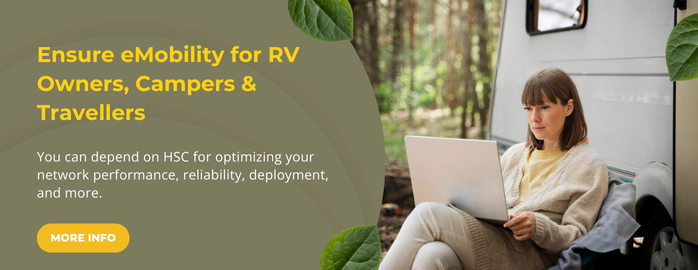Long-haul travelling or weekend trips are no more about disconnecting from the world. Many travellers who explore the world on their RV (Recreational Vehicle) seek cost-effective internet solutions for checking emails, studying route maps and connecting to work for short intervals.
A survey found that within the last 20 years, RV owners in the US have increased by 62%. These constitute of 11.2 million households, many of which combine cross-country travel with employment. Are you one of those RV owners who prefer staying connected with the real world even with their roving lifestyle?

If this is the case, then satellite internet for RVs can be the best and most feasible option for you. Irrespective of the travel frequency or distance, your RV can receive internet services round-the-clock, functioning as a low-cost Wi-Fi.
Over the last decade, multiple options for internet connection in RVs have made their way into the market. The effectiveness of the service depends on factors like travel routes, demography, and type of solution opted by the user. Some of the internet service options that users in the US have access to are:
When it comes to driving all the way long on the road, cellular data can be a good choice. Just switching on the mobile hotspot when required can be an effective solution if limited internet access is required. Many cost-effective cellular data plans are available in the market, providing safe internet connectivity even at remote locations.
Satellite internet for RVs has been gaining popularity since Starlink came into the market. Satellite internet offers the advantage of portability and wide availability. This is preferable for travellers staying at the same location for a longer period of time.
Public Wi-Fi or Campground Wi-Fi is another internet service choice available for RV owners. For places providing the benefit of free public Wi-Fi, these are a great way to save on internet costs. However, security can be a concern as anyone can gain access to the public network.
Many internet service providers offer nationwide hotspot connectivity which is easily accessible for registered users. Though readily available in cities and towns throughout the country, this connectivity may not be present in the wilds and remote destinations.
When it comes to RVs, the first idea everyone gets in their mind is exploring the unexplored, travelling far away via road with the comfort of a home. But often fulfilling the spirit of adventure needs to be balanced with staying connected to the world, and this can sometimes be a challenge on certain routes due to the following reasons:
There are a variety of famous camping destinations that are in remote areas with weak or somewhat non-existent cell service. These places make it difficult for RV owners to keep a check on their emails and the basic tasks of making calls.
While there is access to some campground Wi-Fi at certain locations, those are unreliable, unsafe, slow, and overcrowded. Moreover, the uploading or downloading speed is usually too slow which makes the Wi-Fi unreliable for regular work and the connectivity issues become frustrating for the users.
Most RV models are made of aluminium and fibreglass to maintain their lightweight and affordability. But these materials can also act like signal blockers, weakening the already limited cellular network that reaches the RVs.
Many of the data plans offered by cellular companies have data restrictions or caps. In case that you use more data than allocated while browsing the internet, this may result in additional expenses.
The last two decades have witnessed a gradual change and improvement in connectivity and bandwidth for RV users with the launch of satellite internet.
Satellite internet for RVs has now become a popular phenomenon after Starlink launched its services. While many service providers have emerged in the market, here are the top 5 portable satellite internet service providers for RVs based on their features and accessibility:
The first and foremost portable satellite internet provider for RVs, Starlink has developed as a reliable player in this market. Their device is super portable and takes less space in your RV. Their most attractive feature for users like you is that they do not have a data pack limit, and no annual contract is required. While their service is comparatively costly, you get the best in the segment.
Another preferred service provider for satellite internet in RVs, Mint Mobile has great mobile hotspot plans with easy access. Setting up the device is as smooth as its access and users like you can easily install it with minimum intervention.
A great value-for-money alternative in the portable satellite internet provider market, T-Mobile provides you access to a seamless 5G connection, along with 4G LTE. Their device delivers the power of Wi-Fi 6, USB type C port and supports up to 32 Wi-Fi enabled devices.
Another major player in the portable satellite internet service realm, Hughesnet is available for certain fixed locations only, unlike other players. You must get into an annual contract with the company, which also has a data cap of 200GB. Their service is good barring a few limitations, this won’t affect your pocket and is considered a good option for weekend travellers using RVs.
A fixed location service provider of satellite internet for RVs, Viasat offers unlimited data without any contract requirement. Their service is effective but can be comparatively expensive for some RV owners.

All portable satellite internet services are powered by wireless communication systems known as Non-terrestrial Networks or NTN. These wireless communication systems operate above the Earth’s atmosphere and use satellites at low-earth orbit (LEO), medium-earth orbit (MEO), geostationary (GEO), and high-altitude (HAPS) to provide internet coverage to remote areas without terrestrial service.
Used during emergency communications, in remote areas for agriculture and other processes, and most preferably in connected vehicles, such as cars, trucks and RVs. NTNs deliver reliable high-speed wireless network access in remote areas and ensure steady connection even to travellers.
One of the well-known NTNs, Hughes Systique (HSC) has expertise with portable satellite internet and deals with global players in the communication space. Its varied experience with modular development and terrestrial networks eases adapting to 4G and 5G air-interface protocols for the non-terrestrial environment. HSC features high amongst NTN service providers due to their long-standing background in physical layer stack development for experimental configurations and novel radio environments.